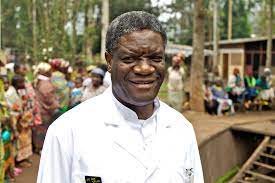According to Dr. Denis Mukwege, the time has come to break with policies aimed at promoting those who should account for their actions before justice.
The recent appointment by presidential order of a former rebel leader of RCD-Goma, M-23 and the Alliance for the Liberation of Eastern Congo (ALEC), as Coordinator of the Disarmament, Demobilisation, Community Rehabilitation and Stabilisation Programme (P-DDRCS) did not go down well with the winner of the 2018 Nobel Peace Prize.
In a statement released on Wednesday, Dr. Mukwege, a gynaecologist and human rights activist expressed his reservations following the promotion of Emmanuel Tommy Tambwe Rudima to head the P-DDRCS.
“By rewarding criminals instead of bringing them to justice, this strategy of string-pullers lurking in Kinshasa (DRC), Kigali (Rwanda), Kampala (Uganda) and Bujumbura (Burundi) encourages armed groups in the bush to wait for their turn,” the 2014 Sakharov Prize laureate lamented.
Dr Mukwege is all the more distressed because “this situation favours the emergence of a system that legitimises violence and the commission of crimes as a way of gaining access to power. (And) it maintains (at the same time) an infernal spiral of endless violence and jeopardises the establishment of a lasting peace”.
On the basis of this, he believes that in order to move forward on the path to lasting peace, the leaders of his country should learn from the mistakes of the past and break with the policies that have prolonged and aggravated the suffering of the Congolese people and the instability that has had disastrous consequences for the protection of civilians.
To this end, he called for the adoption of a holistic national strategy for transitional justice.
According to him, this strategy should prioritise institutional reforms aimed at preventing the non-repetition of atrocities committed against civilians, in particular through a profound reform of the security and justice sectors.
“The most obvious link between transitional justice and institutional reform is the establishment of vetting procedures aimed at identifying and removing from public institutions those responsible for violations of human rights and international humanitarian law, as well as the establishment of human rights vetting mechanisms for those who aspire to enter public service,” he said.
He stressed that as part of the genesis of the transitional justice process to which the Congolese people aspire, the government should also undertake, without delay, institutional reforms to ensure respect for the rule of law, promote a culture of human rights and restore confidence in state institutions.
According to the evangelical Pentecostal pastor, if there is a real political will to implement his recommendations, the government of President Félix Tshisekedi will be able to count on the men and women of integrity with no record of serious human rights violations available in his country.
“The time has come to make full use of the potential of this peace- and justice-loving human capital and to break with policies aimed at promoting those who should be held accountable for their actions,” he concluded.
ARD/te/lb/as/APA


